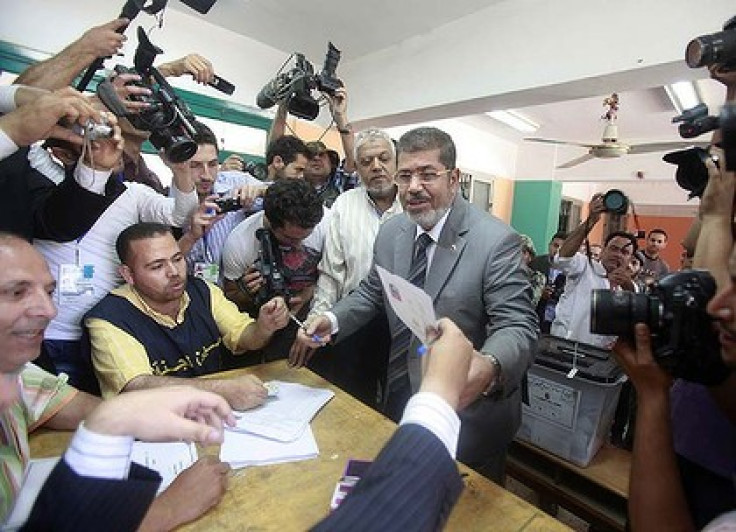Egypt Presidential Elections: Muslim Brotherhood's Morsi v Mubarak's ex-Prime Minister Ahmed Shafiq

Egypt's electoral commission has confirmed that Muslim Brotherhood's candidate Mohammed Morsi and Ahmed Shafiq, last prime minister under ousted president Hosni Mubarak, will run in a stand-off to become the country's next president.
They both received more than 5.5 million votes, with Morsi heading the results with 5.7 million votes.
Islamist moderate candidate Abdel Moneim Abol Fotouh received 4 million votes whereas Nasserist candidate Hamdeen Sabbahi got 4.8 million votes. Former Arab League leader Amr Moussa received 2 million votes.
The voter turnout in Egypt's presidential election was 46,42 percent, which accounts for 23,672,236 voters. Around 460,000 votes were annulated.
In what has been dubbed as the most eagerly anticipated press conference since Mubarak's resignation, the head of the electoral commission Farouk Sultan denied allegations that police, army soldiers and security personals voted in elections.
"The names of ineligible voters were aggregated and sent to all polling stations to be removed from voters' list," he said.
The election committee has rejected all appeals of the first round of elections, allowing Mohamed Mursi and Ahmed Shafiq to enter the second round,
"We received 7 appeals from different presidential candidates over the course of two days," he said. Three appeals were denied for being submitted after the deadline, whereas the other 4 were frivolous errors that do not nullify the elections results.
None of the appeals, according to Sultan, affects the election results.
Egypt's Nasserist Karama Party of Hamdeen Sabahy had announced plans to boycott next month's presidential runoff poll in the event of a showdown between Mursi and Shafiq.
"The party rejects the notion of the Muslim Brotherhood dominating the country's legislative bodies," read a party statement issued on Sunday. "And it also rejects the notion of handing power over to remnants of the old [Mubarak] regime."
Moderate Islamist candidate Fotouh, a former Brotherhood member, alleged that vote rigging has taken place during the vote and that some representatives of candidates had access to polling stations denied.
"I reject these results and do not recognise them," he said.
"The national conscience does not allow for labelling these elections honest."
Former Arab Leader chief Amr Moussa also questioned the elections' outcome.
"There are question marks on the result of the election," Moussa told a news conference. "There were violations, but this should not change our minds on democracy and the necessity of choosing our president."
The Salafi-backed Nour Party has said that its support for the Brotherhood's Morsi is not negotiable for religious reasons. "We have no other option," said Shabaan Abdel Latif, the party's secretary.
He stigmatised the possible election of Mubarak's aide Shafiq as "the end of the revolution in every sense of the word".
Independent MP Amr Hamzawy has fuelled rumours that Muslim Brotherhood candidate Morsi drop out of the race in favour of Sabbahi, saying it is legally possible.
"To those who call on Shafiq to withdraw, I say he stands on different grounds, and those who voted for him will not see in Sabbahi a representative for them," he said. "As for the Brotherhood, they belong to the revolution like Sabbahi."
Hamzawy has called on Morsi to withdraw from the runoff to defend the revolution's values.
"If the Muslim Brotherhood wants to have a consensus that saves the revolution, democracy and the civilian state, and prevent the reproduction of the old regime and its domination, let Morsy withdraw," Hamzawy wrote on Twitter.
The run-off is supposed to take place on 16 and 17 June but the vote-rigging allegations may delay the run-off although unlikely.
© Copyright IBTimes 2024. All rights reserved.






